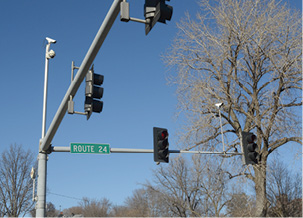
By LESLIE COLLINS
Northeast News
February 12, 2014
Now that Kansas City’s red light camera program has been suspended indefinitely, Kansas City is seeing an increase in red light camera violations.
Due to a pending court case, the city has put a halt to issuing red light camera ticket violations but is still monitoring camera footage at the 13 red light camera intersections. Four of those intersections are in the city’s top 10 list of high crash locations.
According to raw data released by the city’s red light camera vendor American Traffic Solutions, cameras recorded a 48 percent increase in red light camera violations in December 2013 compared to December 2012, said Maj. Jim Pruetting of the Kansas City Police Department (KCPD) Traffic Division. Pruetting provided the update during a recent city Public Safety and Emergency Services Committee meeting.
“Going up 48 percent in a short time period, that type of behavior is really significant,” Pruetting told Northeast News. “Red light cameras serve a purpose – changing behavior is the goal.”
Prior to the red light camera program being suspended in November of 2013, the city saw a decrease each year in the number of red light camera violations. The city first implemented the program in 2009 and by 2012, recorded a 31 percent decrease in the number of red light camera violations compared to the previous year.
When drivers run red lights and cause a t-bone crash, it diminishes the advantages of wearing a seatbelt, said Pruetting.
“People expect when they have a green light at an intersection they’ll be able to pass through without getting hit,” he said. “It is concerning that they’re (red light camera violations) up that high. We are going to double our efforts at those intersections.”
Kansas City City Council member Scott Taylor commended the red light camera program and said drivers pay attention to the tickets. Eighty-six percent of individuals who receive a red light ticket learn their lesson and don’t receive a second one, Taylor said. Ninety-seven percent of red light violators don’t receive more than two tickets, he added.
“It’s an effective program,” Taylor said. “We’re hopeful the courts will get this resolved as soon as possible from a public safety aspect.”















